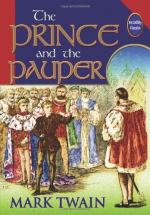“Yet did my brother Hugh turn these faults to good account—he seeing that our brother Arthur’s health was but indifferent, and hoping the worst might work him profit were I swept out of the path—so—but ’twere a long tale, good my liege, and little worth the telling. Briefly, then, this brother did deftly magnify my faults and make them crimes; ending his base work with finding a silken ladder in mine apartments—conveyed thither by his own means—and did convince my father by this, and suborned evidence of servants and other lying knaves, that I was minded to carry off my Edith and marry with her in rank defiance of his will.
“Three years of banishment from home and England might make a soldier and a man of me, my father said, and teach me some degree of wisdom. I fought out my long probation in the continental wars, tasting sumptuously of hard knocks, privation, and adventure; but in my last battle I was taken captive, and during the seven years that have waxed and waned since then, a foreign dungeon hath harboured me. Through wit and courage I won to the free air at last, and fled hither straight; and am but just arrived, right poor in purse and raiment, and poorer still in knowledge of what these dull seven years have wrought at Hendon Hall, its people and belongings. So please you, sir, my meagre tale is told.”
“Thou hast been shamefully abused!” said the little King, with a flashing eye. “But I will right thee—by the cross will I! The King hath said it.”
Then, fired by the story of Miles’s wrongs, he loosed his tongue and poured the history of his own recent misfortunes into the ears of his astonished listener. When he had finished, Miles said to himself—
“Lo, what an imagination he hath! Verily, this is no common mind; else, crazed or sane, it could not weave so straight and gaudy a tale as this out of the airy nothings wherewith it hath wrought this curious romaunt. Poor ruined little head, it shall not lack friend or shelter whilst I bide with the living. He shall never leave my side; he shall be my pet, my little comrade. And he shall be cured!—ay, made whole and sound —then will he make himself a name—and proud shall I be to say, ’Yes, he is mine—I took him, a homeless little ragamuffin, but I saw what was in him, and I said his name would be heard some day—behold him, observe him—was I right?’”
The King spoke—in a thoughtful, measured voice—




